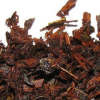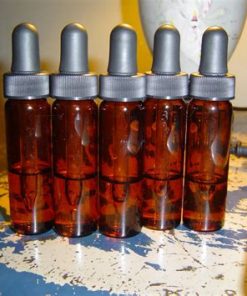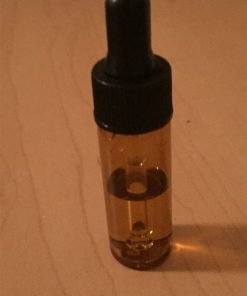DMT (N,N-Dimethyltryptamine)
$200.00 – $5,000.00Price range: $200.00 through $5,000.00
DMT (N,N-Dimethyltryptamine)
DMT (N,N-Dimethyltryptamine) (DMT or N,N-DMT) is a substituted tryptamine that occurs in many plants and animals and which is both a derivative and a structural analog of tryptamine.[3] It is used as a recreational psychedelic drug and prepared by various cultures for ritual purposes as an entheogen.[4]
DMT has a rapid onset, intense effects, and a relatively short duration of action. For those reasons, DMT was known as the “business trip” during the 1960s in the United States, as a user could access the full depth of a psychedelic experience in considerably less time than with other substances such as LSD or psilocybin mushrooms.[5] DMT can be inhaled, ingested, or injected and its effects depend on the dose, as well as the chosen mode of administration. When inhaled or injected, the effects last a short period of time: about five to 15 minutes. Effects can last three hours or more when orally ingested along with an MAOI, such as the ayahuasca brew of many native Amazonian tribes.[6] DMT can produce vivid “projections” of mystical experiences involving euphoria and dynamic hallucinations of geometric forms.[7]
DMT (N,N-Dimethyltryptamine)
DMT is a functional analog and structural analog of other psychedelic tryptamines such as O-acetylpsilocin (4-AcO-DMT), 5-MeO-DMT, psilocybin (4-PO-DMT), psilocybin (4-HO-DMT), and bufotenin (5-HO-DMT). The structure of DMT occurs within some important biomolecules like serotonin and melatonin, making them structural analogs of DMT.
Buy DMT Online
Buy DMT Online. DMT (N,N-Dimethyltryptamine) is a molecule that occurs naturally in many plants and animals. When abused, isolated DMT is capable of producing one of the strongest hallucinogenic effects of all psychedelics.
In sufficient doses, DMT will typically cause the user to be completely removed from reality. This can then lead the user to enter a complete hallucinogenic state. While the high typically lasts fifteen minutes, users often report it feeling like much longer periods of time have elapsed. This is due to the intensity of the drug. DMT is typically smoked, but can be snorted or injected as well.
The drug has a long history of use in South America, and is currently still used by various religious groups.
Usage
DMT (N,N-Dimethyltryptamine) is produced in many species of plants often in conjunction with its close chemical relatives DMT (N,N-Dimethyltryptamine) (5-MeO-DMT) and bufotenin (5-OH-DMT).8] DMT-containing plants are commonly used in indigenous Amazonian shamanic practices. It is usually one of the main active constituents of the drink ayahuasca;[9][4] however, ayahuasca is sometimes brewed with plants that do not produce DMT. It occurs as the primary psychoactive alkalod in several plants including Mimosa tenuiflora, Diplopterys cabrerana, and Psychotria viridis. DMT is found as a minor alkaloid in snuff made from Virola bark resin in which 5-MeO-DMT is the main active alkaloid.[8] DMT is also found as a minor alkaloid in bark, pods, and beans of Anadenanthera peregrina and Anadenanthera colurina used to make Yopo and Vilca snuff, in which bufotenin is the main active alkaloid.[8][10] Psilocybin and its precursor psilocybin, an active chemical in many psilocybin mushrooms, are structurally similar to DMT.
The psychotropic effects of DMT were first studied scientifically by the Hungarian chemist and psychologist Stephen Szára, who performed research with volunteers in the mid-1950s. Szára, who later worked for the United States National Institutes of Health, had turned his attention to DMT after his order for LSD from the Swiss company Sandoz Laboratories was rejected on the grounds that the powerful psychotropic could be dangerous in the hands of a communist country.[11]
DMT is generally not active orally unless it is combined with a monoamine oxidase inhibitor (MAOI) such as a reversible inhibitor of monoamine oxidase A (RIMA), for example, harmaline.[4] Without a MAOI, the body quickly metabolizes orally administered DMT (N,N-Dimethyltryptamine) and it therefore has no hallucinogenic effect unless the dose exceeds the body’s monoamine oxidase’s metabolic capacity. Other means of ingestion such as vaporizing, injecting, or insuffating the drug can produce powerful hallucinations for a short time (usually less than half an hour), as the DMT reaches the brain before it can be metabolized by the body’s natural monoamine oxidase. Taking a MAOI prior to vaporizing or injecting DMT prolongs and potentiates the effects.[7]
DMT (N,N-Dimethyltryptamine)Injection
In a study conducted from 1990 through 1995, University of New Mexico psychiatrist Rick Strassman found that some volunteers injected with high doses of DMT reported experiences with perceived alien entities. Usually, the reported entities were experienced as the inhabitants of a perceived independent reality that the subjects reported visiting while under the influence of DMT.[11]
| SELECT QUANTITY | 3G, 5G, 1/2 OUNCE, 1 OUNCE, 1/4 POUNDS, 1/2 POUNDS, 1 POUND |
|---|
Reviews
There are no reviews yet.


















Be the first to review “DMT (N,N-Dimethyltryptamine)”